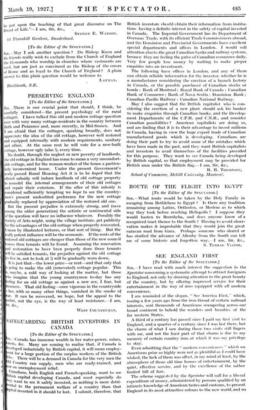PRESERVING ENGLAND
[To the Editor of the SPECTATOR.] Sin,—There is one crucial point that should, I think, be carefully considered—the present psychology of the rural cottager. I have talked this old and modern cottage question over with very many cottage-residents in the country between Bath and Penzance and, more recently, in Mid-Sussex. And I am afraid that the cottager, speaking broadly, .does not appreciate the idea of the old cottage, however well restored and equipped internally with modern requirements, sanitary and other. At the same rent he will vote for a new-built cottage, however ugly (alas !), every time.
No doubt, through the neglect or new poverty of landlords, he old cottage in England has come to mean a very uncomfort- able cottage, and for the woman-worker of the house a particu- larly inconvenient home. Under the present Government's newly passed Rural Housing Act it is to be hoped that the ffered subsidy will induce landlords of old cottage property o remodel the internal arrangements of their old cottages and repair their exteriors. If the offer of this subsidy is nsidered sufficiently tempting we hope to see the country- en's present undoubted preference for the new cottage dually replaced by appreciation of the restored old one. But the present prejudice is extremely strong, and (save mong the older generation) the artistic or sentimental side f the question will have no influence whatever. Possibly the Society of Arts might, using the village institute, get publicity or the advantages of the old cottage when properly renovated, mean by illustrated lectures, or that sort of thing. But the catty potent influence will be the economic. If the rents of the (stored old cottages are cheaper than those of the new council louses then tenants will be found. Assuming the renovation id restoration to have been properly done those tenants rill be satisfied tenants, the prejudice against the old cottage to live in, not to look at !) will be gradually worn down.
It is just that—the lower price—or rent—and that only that going to make the old (renovated) cottage popular. This s. maybe, a cold way of looking at the matter, but those rho imagine that the young countryman to-day has any eeling for an old cottage as against a new are, I fear, but reamers. That old feeling—once vigorous in the countryside has, with so many other things, vanished in the smoke of ar. It can be recovered, we hope, but the appeal to the ket, not the eye, is the way of least resistance.—I am, r, WEST COUNTRYMAN.






























































 Previous page
Previous page